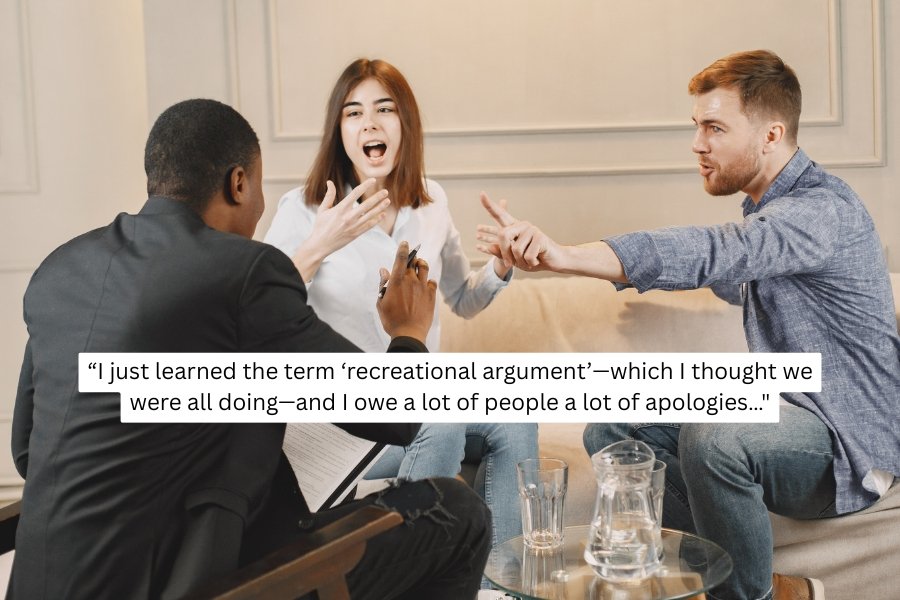Have you ever noticed that some families can get into heated arguments—raised voices, vehement disagreement, rhetorical takedowns—and then act as if no actual conflict has taken place? If you come from a totally-conflict-avoidant or a genuinely-conflict-ridden family, such passionate debates might feel uncomfortable. If you come from a “recreational argument” family, it’s just what people do when they get together.
A woman’s realization that she grew up in the latter kind of family has prompted discussions about the whole idea and has people from all kinds of backgrounds feeling seen. Emmaline (@emmaleendryer) shared in a video, “As someone who came from a recreational argument family…I just learned the term “recreational argument”—which I thought we were all doing—and I owe a lot of people a lot of apologies.”
Why does she owe some apologies? Because if you come from a recreational argument family, where argument is treated as a form of entertainment and debate is seen as an enjoyable activity like playing cornhole, you might assume that’s the norm for everyone. And if you assume it’s normal, you might argue with someone just because, or perhaps even to try to bond with them, and wind up surprised when they don’t respond the way you expect them to. Either the person doesn’t volley with you at all and just seems confused, or they engage in the debate but leave genuinely upset by the interaction.
A Reddit post explained the phenomenon like this:
“There are some people who ‘argue’ for fun. Flexing their rhetorical skills over something of no real-life consequence is a nice way to pass an afternoon. My In-Laws are like this. My father-in-law will argue with anyone about literally anything because to him, this is a fun game and he’d like to play with you, so Thanksgiving and Passover are always somewhat fraught holidays. I suspect a number of people online who are ‘trolling’ aren’t actually trolling, but engaging in what they see as a Perfectly Normal Invitation to play.
“There are about the same number of people, in my experience, that find being in the general proximity of other people arguing the most agitating bullsh_t imaginable. Some people experience this as extreme, irrational annoyance, like people with misophonia when they hear chewing, and for some people the clinical meaning of the term ‘Triggered’ is applicable here because disagreements will, genuinely, trigger major psychological distress. Often, the more pointless and trivial the argument, the more agitating it is.
“The majority of people are somewhere in the middle of these extremes, and would like everyone else to mind their manners.”

To be clear, recreational arguing isn’t fighting. There’s no actual conflict taking place, but for those who are used to only experiencing debates or disagreements as fights, a passionate debate can feel like—and therefore be mistaken for—real conflict.
People in the comments clearly fell into different camps, further elucidating the point. Those who came from recreational argument families discussed the enjoyment they get out of arguing:
“It’s fun to debate vigorously.”
“What’s the point in having a brain if you aren’t going to use it? I could argue about literally anything because it’s fun to really think about sh_t. I don’t understand how you can enjoy life without a little recreational argument tbh.”
“I love recreational arguing. Growing up my siblings and I were constantly like we’re not fighting — this is just how we talk.”
“Why are you arguing??’ Bro I thought this was just a conversation?”
“I have never heard the term recreational arguing before but this is the perfect explanation for why I enjoy a good debate and other people hate me for it .”
“I married outside of the recreational argument community. I love him but it’s tough.”
“I come from a playful roasting family and i for sure accidentally bullied some kids in elementary school that I thought I was friends with.”
However, those who didn’t grow up with that normalized explained how uncomfortable it is to be around:
“It’s so stressful for someone who does not do recreational arguing. “
“YEP I go into full fight or flight every single time. It’s so emotionally taxing for me to even witness it!”

“Yep my husband and father in law discuss politics and religion regularly and energetically. they get so riled up sometimes and I just hide in my room. I don’t do raised voices well, even when I know they aren’t mad, they are just loud talkers. “
“Cannot emphasize enough how much I DESPISE recreational arguing and debates. Literally hell on earth to be in a group of people like that.”
And then there were the people who came from one kind of family but felt like they belonged in another:
“i grew up in a household where people just did not talk to each other. The first time i spent time with a recreational argument family it was like i was freed from a cage. I love it. i love talking and thinking and exploring and learning.”
“Try being a recreational arguer in a family where people argue argue. I just wanna have a nice fun disagreement but now everyone is mad.”

“I yearn to be a recreational argument family so I married into one… visiting my own family I often forget & get labeled argumentative… like yeah I’m trying to have stimulation conversation here.”
“What is it called when your family tries to be a recreational argument family but it almost always blows up into real fights? “
Emmaline’s admission that she might owe some apologies highlights the importance of understanding these different perspectives. If we assume all people view passionate discussions the way we do, we risk creating actual conflict or at the very least some uncomfortable feelings. When we listen to different people’s perspectives like those shared in the comments of Emmaline’s video, it’s easier to see when it may not be the right time—or the right person—to engage in a debate, especially if it’s just for fun.


































